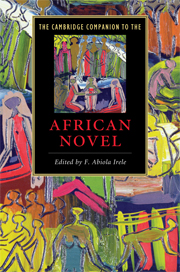Book contents
- Frontmatter
- 1 Introduction: perspectives on the African novel
- 2 The oral-literate interface
- 3 Chinua Achebe and the African novel
- 4 Protest and resistance
- 5 The Afrikaans novel
- 6 The African novel in Arabic
- 7 The francophone novel in North Africa
- 8 The francophone novel in sub-Saharan Africa
- 9 The African historical novel
- 10 Magical realism and the African novel
- 11 The African novel and the feminine condition
- 12 Autobiography and Bildungsroman in African literature
- 13 The postcolonial condition
- 14 New voices, emerging themes
- 15 The critical reception of the African novel
- Bibliography
- Index
10 - Magical realism and the African novel
Published online by Cambridge University Press: 28 January 2010
- Frontmatter
- 1 Introduction: perspectives on the African novel
- 2 The oral-literate interface
- 3 Chinua Achebe and the African novel
- 4 Protest and resistance
- 5 The Afrikaans novel
- 6 The African novel in Arabic
- 7 The francophone novel in North Africa
- 8 The francophone novel in sub-Saharan Africa
- 9 The African historical novel
- 10 Magical realism and the African novel
- 11 The African novel and the feminine condition
- 12 Autobiography and Bildungsroman in African literature
- 13 The postcolonial condition
- 14 New voices, emerging themes
- 15 The critical reception of the African novel
- Bibliography
- Index
Summary
The term “oral traditions” is normally employed by Africanists to denote the field of non-literary or non-written resources. The term occupies the same semantic field as the term “orality” though the second term seems to have arisen in opposition to the implicit valorization of “literacy” in studies of non-industrial cultures and their differences from industrial ones. Orality was then extended to denote a set of conceptual skills which bear the same status as literacy in constituting a sense of cultural identity. In this usage it transcends the past-orientated sense of “oral traditions” to embrace a notion of generalized concepts, symbols, rhetorical capacities, and even unarticulated assumptions whose inspiration is the totality of oral culture. As F. Abiola Irele points out, it is significant also to remember that literary writing in Africa performs an integration of what he terms “aesthetic traditionalism.” Orality in Africa is not just a mode of speech different from writing, but undergirds an entire way of life. More importantly, the traditional esthetic forms that abound within African orality impact upon everyday environments as well as in more formal ritual contexts. The proverb, for example, opens up the “possibilities for mental processes and even cognitive orientation” and “represents a compaction of reflected experience and functions as a kind of minimalism of thought.” African writing takes inspiration from these resources of orality in order to establish a distinctive account of the African world. Most contexts of orality exhibit a high level of polysemy in terms of the materials employed within each genre.
- Type
- Chapter
- Information
- The Cambridge Companion to the African Novel , pp. 159 - 176Publisher: Cambridge University PressPrint publication year: 2009
- 9
- Cited by

